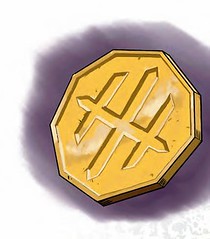“The Sovereign of World and Wealth,”
Neutral
Kol Korran is the god of trade, wealth, and commerce. He is the only second-generation member of the Sovereign Host, which is appropriate since wealth and trade appear only after the other elements of society fall into place. As the most avaricious of the Host, Kol Korran is patron to merchants, traders, and all who seek wealth; in his darker aspect, he is also the patron of thieves and fences. He is loyal to the Host, but some legends ascribe to him a sense of resentment and a feeling that the other gods do not consider him an equal. This does not manifest as overt hostility, but rather as schemes to enrich himself at the expense of the others. Thus, fables sometimes portray Kol Korran—despite his usually serious demeanor—as the prankster of the gods.
He is depicted as a fat, cheerful human or dwarf in fi ne clothes. A few ancient representations of him show a white dragon lying on a bed of ice-blue gemstones. Said to be the son of Olladra and Onatar and the twin brother of the Keeper
Portfolio: Wealth, money, trade, commerce, theft.
Domains: Charm*, Commerce*, Pact‡, Trade‡, Travel, Wealth‡.
Priest Training: Most of Kol Korran’s priests have a head for numbers and commerce, and many were merchants or shopkeepers before taking the oaths. All are expected to learn something of business so they can counsel entrepreneurs who seek advice.
Quests: Quests in Kol Korran’s name include opening up new trade routes, or discovering and retrieving items of great worth.
Prayers and Rites: Most rites to Kol Korran require the supplicant to melt money or similar valuables, sacrificing a small amount of wealth in exchange for earning far greater.
Shrines: Kol Korran’s temples might be of stone or wood, but they always use the best available materials. The most opulent are decorated in tapestries and silks of gold and silver. Those in the poorest communities sport the greatest riches that can be spared, and are painted to appear as though they contain more than they do.
Favored Weapon: Heavy mace.
Holy Symbol: A nine-sided gold coin stamped with the Octogram, or the Octogram in gold and silver, representing the wealth of precious metals.
Luck as We Know It
Many modern Vassals point to Olladra as proof that Arawai and Balinor are not the only two members of the Host with dominion over natural forces, rather than aspects of civilization. Luck is universal, neither a civilized nor a savage concept.
In fact, they are quite wrong. In most ancient societies, and in the vast majority of today’s primitive cultures, luck does not exist as a concept. People might pray for good fortune, but their prayers are directed to the gods or spirits of the relevant aspect of the world. Fortune in trade is the province of gods of trade; success in games of chance comes from the gods of games or from household spirits. “Fortune” as an independent aspect of life is very much a modern, civilized concept. After all, it was not until mortals formed societies that life became easy enough—relatively speaking—for them to devote any thought to the notion of “good luck” applied to anything other than the necessities of survival.










